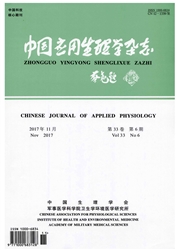

 中文摘要:
中文摘要:
目的:研究大鼠弥漫性颅脑创伤后脑组织中脑红蛋白的表达变化情况,探究创伤后脑红蛋白表达变化及其与神经元凋亡的关系。方法:采用雄性SD大鼠50只,随机分为10组(n=5)空白对照组、伤后30min、1h、2h、6h、12h、24h、48h、72h和5d组。以Marmarou’s自由落体打击装置复制颅脑创伤模型,采用免疫组化技术检测伤后不同时间脑组织中脑红蛋白的表达情况及神经元凋亡相关基因Bax、Bcl-2表达情况,并对所得数据进行统计学分析。结果:致伤区皮层神经元脑红蛋白表达分别于伤后2h、72h呈现出两次高峰表达;伤后30min~1h、48~72h期间大脑皮层区脑红蛋白表达的上调均伴随着Bax/Bcl-2比值上升趋势减缓甚至呈现下降趋势。结论:弥漫性颅脑创伤后脑组织中脑红蛋白的高表达在一定程度上可以拮抗创伤应激及伤后继发缺血、缺氧性损伤所导致的神经元凋亡,在颅脑创伤的超早期(〈3h)、急性期(〈72h)可能具有一定的神经保护作用。
 英文摘要:
英文摘要:
Objective:To study the expression changes of neuroglobin in rats with the model of diffuse traumatic brain injury and explore the relationship between the neuroglobin and neuron apoptosis in traumatic brain injury.Methods:The diffuse traumatic brain injury of rats was induced by the Marmarou's 'weight-drop' device.And the immunohistochemical technique was used to detect the expression changes of neuroglobin and neuron apoptosis in rat brain at different time points post-injury.Results:The expression of neuroglobin increased twice and reached peaks at 2 hours and 72 hours post-injury respectively.And the increased expression of neuroglobin from 30 minutes to 1 hour post-injury and from 48 hours to 72 hours post-injury accompanied with the decreased expression ratio of Bax to Bcl-2.Conclusion:The increased expression of neuroglobin in traumatic brain injury informed us that neuroglobin had anti-apoptosis action in post-injury neuron.It could protect the neuron from traumatic stress and secondary ischemia and hypoxia insults during ultra-early and acute stages.
 同期刊论文项目
同期刊论文项目
 同项目期刊论文
同项目期刊论文
 期刊信息
期刊信息
